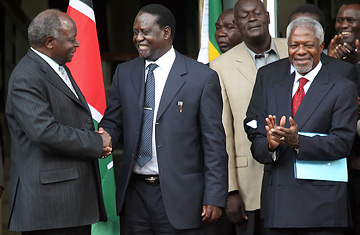
Kenya's President Mwai Kibaki (L) shakes hands with opposition chief Raila Odinga (2ndL) after signing a deal in Nairobi as chief mediator Kofi Annan (R) looks on on February 28, 2008.
Former U.N. Secretary-General Kofi Annan was at the end of his rope this week. The diplomat has been the often-optimistic mediator at talks in Kenya aimed to resolve the dispute over December's presidential elections between President Mwai Kibaki and opposition leader Raila Odinga. But at a press conference on Tuesday, a visibly frustrated Annan said he would suspend the peace talks that had continually stalled due to hard-liners on both negotiating teams. Annan said he was then going to "take the matters up" with the leaders themselves.
His plan worked. Two days later, the bitter Kenyan rivals signed a power-sharing deal that will establish a coalition government and potentially end the crisis that has claimed more than 1,500 lives. "Compromise was necessary for the survival of this country," Annan said at the signing of the deal on Thursday. Kenya's latest elections saw incumbent President Kibaki defeat Odinga in a race opposition supporters claim was rigged. Riots and looting occurred nationwide, blocking trade routes and killing over hundreds. Aid agencies estimate nearly half a million people have been displaced by the conflict. Brutal ethnic clashes erupted in the country's west. Images of hacked bodies and Kenyans burnt to death scared off tourists, bringing Kenya's biggest industry to its knees.
Even Odinga and Kibaki, who seemed irreconcilable just weeks ago, decided that enough was enough. On Thursday, Kibaki said, "Kenya has room for all of us if we enhance peace and tolerance ... today I stand before you to give a solemn commitment that I will be on the forefront to protect that peace."
Kibaki's negotiating team had repeatedly been accused by the opposition of deliberately delaying the talks in order to hold on to power. But the President today pledged to push the coalition deal into law. Odinga echoed his sentiments, saying, "On our side, we are determined to ensure that this agreement succeeds. We have begun a journey and this journey we will walk together." For the first time since December 27's elections, he referred to Kibaki as "the President."
The road to peace, however, remains murky. The power-sharing agreement establishes the post of Prime Minister for Odinga, while Kibaki will remain president. The Prime Minister post will be an executive position that will coordinate and oversee the functions and affairs of the government. Both parties share the duties of appointing deputy prime ministers and cabinet ministers.
But the proposed reforms will still have to pass through a deeply divided parliament next week. Government members of parliament have told reporters that they feel obligated to do the minimum to accommodate opposition demands, rather than engage in what U.S. Secretary of State Condoleezza Rice, on a recent trip to Kenya, called "real" power-sharing. Meanwhile, the opposition parties do not have enough seats in parliament to approve the reforms alone; another coalition of votes would be needed.
If government MPs decide to stonewall constitutional reforms to legalize the coalition, mass violence will likely resurface in towns like Nakuru, where bows and arrows flew among swinging machetes during the height of the violence, killing dozens. Like several Kenyans, Nakuru resident Irene Wairimu had a mixed reaction to the deal. "I think it is good that the leaders can come together and agree. But I am cautious. It is too early to say that it is over."
